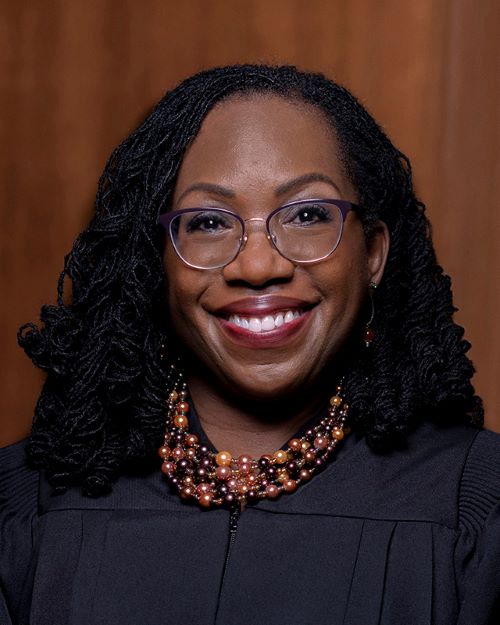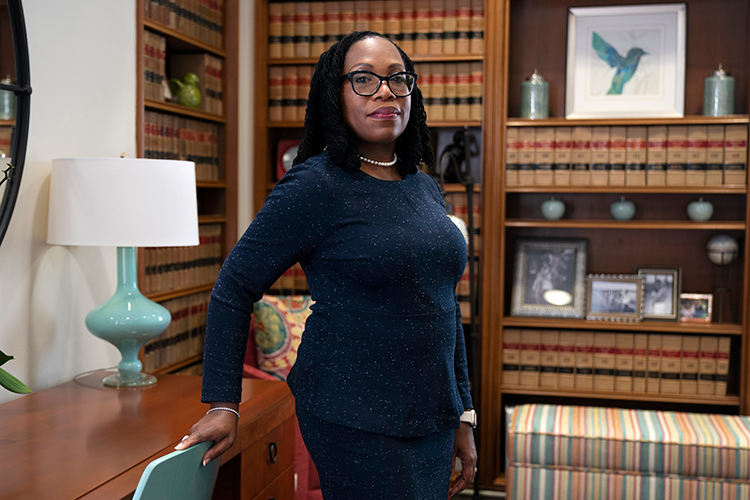Justice Ketanji Brown Jackson makes her mark during first term on the Supreme Court

U.S. Supreme Court Justice Ketanji Brown Jackson has written six majority opinions this term. Photo from the Supreme Court.
Justice Ketanji Brown Jackson was not at a loss for words in her first term on the U.S. Supreme Court. Jackson made her mark early with aggressive and sometimes loquacious questioning from the bench. When she asked a lawyer a question during his short rebuttal time in the first argument of the term, Chief Justice John G. Roberts Jr. passed her a note, evidently with a reminder that the court had recently moved to allowing lawyers to make their rebuttal without interruption.
Jackson has written six majority opinions this term (about the name number as her colleagues) on the sorts of technical or low-profile subjects that any new member of the high court is likely to be assigned: immigration procedures, access to courts, bankruptcy law and a federal law about abandoned money orders.
As the court was finishing up its work this month, Jackson was churning out dissents, some solo, some with liberal colleagues and another that attracted the support of a conservative colleague.
And while mostly laying low off the bench, amid ethics controversies that swirled around some of her colleagues and the institution itself, Jackson found time this spring to address law school graduates on her love for the TV show Survivor and Broadway musicals.
“I have found that when I’m in unfamiliar surroundings, facing new and daunting challenges, one of the things I do is to focus on the constants, the things outside the law that form a central part of my life and that bring me joy,” Jackson said to Boston University School of Law graduates on May 21. “And for me, that constant outside thing, in addition to my wonderful family, has always been the performing arts and especially musical theater.”
But it is Jackson’s work output that was being most closely scrutinized by court observers.
“She has hit the ground running,” says Ralph Richard Banks, a professor at Stanford Law School and faculty director of the Stanford Center for Racial Justice. “She seems to have already found her voice, both literally in oral arguments and in her opinions.”
Questions in Voting Rights Act case get noticed
Jackson made what was arguably her strongest impression on the second day of arguments in October in a major case about the Voting Rights Act of 1965.
She challenged Alabama’s solicitor general, Edmund G. LaCour Jr., who was defending the state’s congressional remap with only one Black majority district and arguing that sorting voters by race was prohibited by the 14th Amendment.
“Why is it that you think that there’s a 14th Amendment problem” with changes that a three-judge federal district court ordered to the remap, Jackson asked LaCour during the Oct. 4 arguments in Allen v. Milligan.
“I don’t think that the historical record establishes that the founders believed that race neutrality or race blindness was required, right?” Jackson continued, adding that the 14th Amendment “was drafted to give … a constitutional foundation for a piece of legislation that was designed to make people who had less opportunity and less rights equal to white citizens.”
The New Republic said she “sent legal Twitter ablaze” as she “vigorously debunked the right’s shameless revisionist history of the 14th Amendment.”
During the Oct. 31 arguments over affirmative action in college admissions, Jackson received notice for her questions in the case of Students for Fair Admissions v. University of North Carolina. (She recused herself from the companion case involving Harvard University, presumably because she served on Harvard’s Board of Overseers until last year.)
She described two hypothetical applicants to the University of North Carolina: a white student who would be the fifth generation of his family to attend the school, and a Black student whose ancestors were enslaved in North Carolina and did not have the chance to attend the institution.
Under the challengers’ idea that race may not be considered, “The first applicant would be able to have his family background considered and valued by the institution as part of its consideration of whether or not to admit him, while the second one wouldn’t be able to because his story is in many ways bound up with his race and with the race of his ancestors.”
She asked why that wouldn’t be its own 14th Amendment equal protection violation.
On Thursday morning, the Supreme Court ruled the admissions policies at Harvard University and the University of North Carolina violate the 14th Amendment’s equal protection clause. Jackson wrote a dissent that Justices Elena Kagan and Sonia Sotomayor joined.
 “She has hit the ground running,” says Ralph Richard Banks, a professor at Stanford Law School and faculty director of the Stanford Center for Racial Justice. “She seems to have already found her voice, both literally in oral arguments and in her opinions.” Photo by Jacquelyn Martin/The Associated Press.
“She has hit the ground running,” says Ralph Richard Banks, a professor at Stanford Law School and faculty director of the Stanford Center for Racial Justice. “She seems to have already found her voice, both literally in oral arguments and in her opinions.” Photo by Jacquelyn Martin/The Associated Press.
Churning out the majority opinions, concurrences and dissents
Kate Shaw, a professor at Yeshiva University’s Benjamin N. Cardozo School of Law and a regular on the progressive-minded Supreme Court podcast Strict Scrutiny, said in Monday’s episode that it has been “amazing” to see “the emergence of Justice Jackson’s voice in opinions.”
“We’ve loved watching her emerge from the bench as a questioner,” Shaw said. “She’s phenomenal … seeing her in dissent, in concurrences, the majority—she’s an incredible writer and thinker.”
Aziz Z. Huq, a professor at the University of Chicago Law School, says Jackson’s most significant majority opinion came June 8 in Health and Hospital Corp. v. Talevski, a case holding that individuals may use a Reconstruction-era civil rights law to enforce rights under a federal nursing home reform law. The 7-2 decision was widely perceived as expanding individuals’ right to sue using Section 1983 of the federal civil rights statute to enforce a variety of rights.
“I do believe she was assigned what will turn out to be a very important decision” with the case, Huq says. “Her opinion shows real legal skill.”
Ilya Somin, a professor at Antonin Scalia Law School at George Mason University, says Jackson wrote one of her most significant dissents in Jones v. Hendrix, a 6-3 decision that held a federal prisoner had no right to file a habeas petition challenging his incarceration even after an intervening Supreme Court decision ruled that the activity he was convicted for wasn’t actually a crime.
Jackson wrote a lengthy solo dissent saying she was “deeply troubled by the constitutional implications of the nothing-to-see-here approach that the majority takes with respect to the incarceration of potential legal innocents.” (Justices Sotomayor and Kagan wrote their own joint dissent.)
Jackson “does a good job of explaining what the majority missed,” Somin says.
She “has a background of something of a civil libertarian, and this is an area where she makes a real difference” because the justice she replaced, Stephen G. Breyer, “was probably the least civil libertarian of the liberal justices,” Somin says.
Jackson was not afraid to go it alone, writing the lone dissent in Glacier Northwest Inc. v. International Brotherhood of Teamsters, which held that the National Labor Relations Act did not bar a state torts claim by a cement company where striking workers caused property damage.
“Today, the court falters” with a “misguided foray” that underscores the wisdom of Congress its creation of the National Labor Relations Board.
Thomas A. Berry, a research fellow at the libertarian Cato Institute in Washington, D.C., was impressed by Jackson’s dissent in United States v. Hansen, a June 23 decision that upheld a federal law that criminalizes certain solicitation of unlawful immigration.
Jackson, in a dissent joined by Sotomayor, said the majority essentially rewrote a provision of the statute to avoid declaring it overbroad under the First Amendment.
“People wondered whether Jackson’s experience as a public defender might add to the perspective she brings to the bench,” says Berry, who helped write an amicus brief in support of the defendant in the case. “I think that does shine through in her Hansen opinion when she talks about the government having its cake and eating it too.”
Referencing children’s books, reality TV and Broadway musicals
Jackson even showed a Kaganesque flourish with a sort of pop culture reference in her dissent in Coinbase Inc. v. Bielski, aan otherwise dry case about arbitration and interlocutory appeals.
“The majority’s analysis comes down to this: Because the pro-arbitration party gets an interlocutory appeal, it should also get an automatic stay,” Jackson wrote, adding “see L. Numeroff, If You Give a Mouse a Cookie (1985).”
Jackson was more explicit with her pop culture references in her May commencement addresses. At American University Washington College of Law in Washington, D.C., on May 20, she said she was a “Survivor super fan” and had watched every season with her family since the second one, and she discussed the lessons the show imparts.
At Boston University’s ceremony the next day, she addressed lessons learned from the musicals Little Shop of Horrors, Hamilton, and American Prophet: Frederick Douglass in His Own Words.
She noted that American Prophet was crafted around Douglass’ actual words and that “that certain phrases are repeated throughout the show but communicated in different formats or contexts, each time resonating with the audience in a distinct or a deeper way.”
“There are many lessons that one can draw from this musical, but the one I wanted to highlight today is that words matter and that the framing does too,” Jackson said. “It’s not just what you say that leaves an impact—it’s also how you say it and how you get your message through to the people you are trying to convince.”
Write a letter to the editor, share a story tip or update, or report an error.


